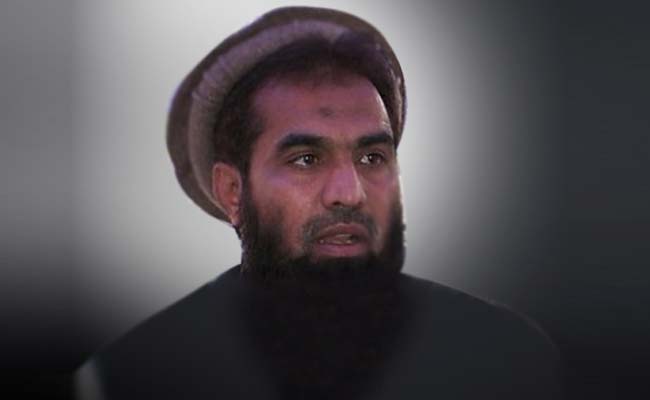Lakhvi Adds to India Pakistan Tension
Zaki-ur-Rehman Lakhvi Granted Bail.

NEW DELHI: The Islamabad High Court (IHC) has declared void the detention orders of Zakiur Rehman Lakhvi, accused in the Mumbai blasts and affiliated with terror outfit Lashkar-e-Taiba. Justice Noorul Haq Qureshi accepted Lakhvi's appeal filed against detention and ordered immediate release thereby granting bail on both cases against him, including the 2008 Mumbai attack case and the six-year-old case involving the kidnapping of an Afghan national. The decision prompted a strong reaction from India.
India’s Home Ministry issued a statement saying, "It is the responsibility of the Pakistan government to take all legal measures to ensure that Lakhvi does not come out of jail."The overwhelming evidence against Lakhvi regarding his role in the criminal conspiracy leading to the Mumbai attack has not been properly presented in the Pakistani court by the Pakistani agencies. This should be ensured without delay," the Home Ministry stated.
In December last year, following international outrage over the decision of an anti-terrorism court in Islamabad to grant bail to Lakhvi, the Pakistani government detained Lakhvi under the Maintenance of Public Order act.
Lakhvi had been granted a bail on the condition of surety bonds amounting to Rs. 500,000. The Pakistani government had said that it would appeal the decision and demand a stay order, but following widespread condemnation, moved in to detain the accused.
Following the government’s detention order, the IHC suspended the detention order, but Pakistan’s Supreme Court on January 7 restored Lakhvi’s detention and asked the IHC to decide on the matter after hearing the federal government’s argument.
The decision of the court to grant bail sent shockwaves more so because it followed a brutal attack by the Tehreek-i-Taliban Pakistan (TTP) on an army-run school in Peshawar, wherein 141 people, including 134 children died. The incident led the world to issue messages to Pakistan asking for a stronger stand against terrorism, and the granting of bail was seen in contradiction to this position.
India led the condemnation, with Prime Minister Narendra Modi saying, "bail to LeT commander Zaki-ur Rehman Lakhvi has come as a shock and is a serious blow to all those who believe in humanity the world over, especially as it comes right after the terror attack in Peshawar." Speaking in Parliament, PM Modi linked the outrage to the events in Peshawar, saying “India is no less saddened than Pakistan by what happened in Peshawar; there are tears in the eyes of each and every Indian."
The Lok Sabha passed a resolution condemning the granting of bail to Lakhvi. According to TOI, “The resolution asked the government to take steps to put pressure on Pakistan to bring the matter related to 26/11 to satisfactory conclusion.”
Earlier, Home Minister Rajnath Singh had immediately reacted to the news as “very unfortunate” and adding that “it should not have happened.” The evidence provided by India to Pakistan was “more than enough” to incriminate Lakhvi, Singh said.
India’s External Affairs Ministry also issued a statement saying that the granting of bail would "serve as a reassurance to terrorists who perpetrate heinous crimes" and called on Pakistan to reverse the decision.
Indian political parties were united in their opposition to the granting of bail, with the Congress party’s Sanjay Jha saying, “We have given all evidence against the perpetrators of the 26/11 attack to Pakistani establishment and it is imperative that the prosecutor ensure justice to the victims” (as told to IANS).
The news of the bail comes as India Pakistan seem set to improve ties following the visit of Indian Foreign Secretary, S. Jaishankar, to Islamabad earlier this month. Although the visit was part of a “Saarc yatra” -- Pakistan was the most significant stop as India had cancelled secretary-level talks -- that had been agreed to during Sharif’s visit for PM Modi’s inauguration ceremony -- over Pakistan’s decision to meet Kashmiri separatist leaders in August last year.Further, tensions between the two countries have been high as border skirmishes across the Line of Control that began in late 2014, continue in 2015, with the latest ceasefire violation taking place just yesterday.
The first sign that India and Pakistan seem to be moving onto surer ground was provided by a meet between Pakistan’s former National Security Adviser Major-General (Retd.) Mahmud Durrani and NSA Ajit Doval and FS S. Jaishankar last month. The Citizen had the reported that the meeting could be an attempt at resuming back channel diplomacy. Although the MEA spokesperson dismissed a question in regard to whether this could pave the way for the resumption of an India-Pakistan dialogue, General Durrani was quoted by The Hindu saying that his impression is that Prime Minister Narendra Modi would “like to move forward” on the dialogue, but would rather not pick up the old format of the composite dialogue process. “Mr. Modi is a different man with a different mind and a different thinking from the previous Prime Minister,” The Hindu quoted General Durrani as saying. “I think he will probably engage with Pakistan, but he would like to do that in his own way.”
In fact, analysts believe that the “Saarc yatra” -- announced by PM Modi when he called Saarc leaders to wish them good luck for the upcoming cricket World Cup -- was a clever diplomatic ploy to kickstart a dialogue process with Pakistan. Having suspended talks in August, the Saarc yatra provided the diplomatic rationale for the FS to visit Islamabad, without India having to retract from its position that it will not tolerate Islamabad drawing Kashmir into the fray.



